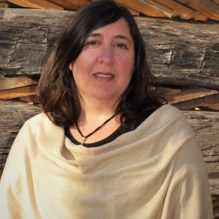Building Trust
By: Alec Masella
July 23, 2018

Executive Master of Natural Resources (XMNR) graduate Kelly Watkinson has taken her skills in sustainability leadership to the national level, now working as the Land and Climate Program Manager for the Land Trust Alliance.
In this recent career shift from local land protection work to a national focus on sustainability leadership, she finds that her experiences in the XMNR program have helped her develop the credentials, competencies, confidence, and connections she needs to succeed in her new role and spearhead a climate change initiative.
“While I was in the XMNR program and prior, I worked in the field of conversation; my most recent position was the Executive Director of a nonprofit conservation organization,” she explains. “It was a land trust in West Virginia, and my team worked with private landowners to develop conservation easements on important agricultural and forest lands in the Cacapon watershed. Conservation easements are legal agreements that place permanent restrictions on a property to protect conservation values.”
Kelly’s experience working with landowners helped grow her expertise in local conservation. It also helped fuel classroom discussion, throughout which she learned about the many facets of sustainability– who the stakeholders are and how she could use her knowledge to take the reins on bigger issues.

“In this new role, I am working with land trusts across the country and helping them figure out how best to bring a climate change lens to their work,” she says. “In the XMNR program, we studied the big picture of climate change, the current challenges, solutions and urgencies. XMNR gave me the knowledge and confidence needed to pursue a position that is bringing a critically important global sustainability issue to the forefront of a land trust community that I have been involved with for over a decade.”
There are four main elements to Kelly’s work with the Land Trust Alliance: increasing the number of land trusts whose strategic conservation plans address climate impacts and promote climate resilience, promoting the use of land to mitigate climate change through the ability of soils and vegetation to absorb and store carbon, empowering land trusts to encourage the buildout of renewable energy facilities while steering them away from sensitive lands, and helping land trusts communicate about climate change to the wider public.
“The Alliance has over 1,000 land trust members that protect and steward millions of acres across the country; it is a robust and impactful community,” Kelly says. “Our most recent training was an all-day workshop in Massachusetts where we introduced the Nature Conservancy’s terrestrial resilience datasets to land trust practitioners. We trained them on how this sophisticated analysis and online mapping tool will help them to prioritize the protection of natural lands where biodiversity has the best chance of surviving and adapting to our changing climate.”
“XMNR taught me the latest academic research on global sustainability issues (like climate change), systems thinking, how best to influence change, and gave me the language and tools I needed for my new position,” she explains. “I am always running into situations where assignments from the XMNR program directly relate to a relationship I am trying to build or a task I am asked to complete. It’s especially moments like those that confirm to me the real value of the XMNR experience.”

---

Kelly Watkinson is an alumna of Virginia Tech’s Executive Master of Natural Resources (XMNR) and Program Manager for the Land Trust Alliance’s Land and Climate Program. As a resource and land conservation professional with 11 years of experience protecting and restoring lands of the Chesapeake Bay watershed, Kelly is responsible for the design and implementation of strategies, trainings and resources for land trusts across the country, working to both adapt to and mitigate climate change. Kelly also has a degree in Environmental Science and Management from Indiana University.
The Center for Leadership in Global Sustainability thanks NomadicStateOfMind; Virginia State Parks; and Nicolas Raymond for making their photographs available for use through a Creatives Commons license.


